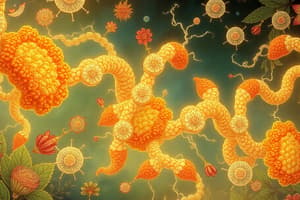Podcast
Questions and Answers
What are the three stages of cellular respiration?
What are the three stages of cellular respiration?
Glycolysis, the citric acid cycle (Krebs cycle or TCA cycle), and oxidative phosphorylation
What is the final stage of cellular respiration and how is ATP synthesized in this stage?
What is the final stage of cellular respiration and how is ATP synthesized in this stage?
Oxidative phosphorylation is the final stage, and ATP is synthesized through chemiosmosis driven by a proton gradient.
Where does glycolysis take place, and what is its end product?
Where does glycolysis take place, and what is its end product?
Glycolysis takes place in the cytoplasm and the end product is two molecules of pyruvate.
Flashcards are hidden until you start studying
Study Notes
Exploring "Tamrīḏ" through Biochemistry Lens
In this educational article, we'll dive into the fascinating world of "tamrīḏ" (Arabic for "medicine") focusing on its biochemical aspects. To provide a holistic approach, we'll discuss relevant subtopics within biochemistry, including cellular metabolism, enzymes, and biochemical pathways.
Cellular Metabolism: The Chemical Reactions Inside Cells
Cellular metabolism encompasses the processes by which cells utilize nutrients to produce energy and synthesize essential molecules. Metabolism involves a series of biochemical reactions, demonstrating the importance of biochemistry in understanding human health and disease.
Enzymes: The Mini-Labs of Our Cells
Enzymes are biological catalysts that speed up biochemical reactions by lowering the activation energy required for a reaction to take place. They are responsible for a multitude of essential processes, such as digestion, repair, and energy production. Enzymes are highly specific, meaning they only catalyze a single reaction or a family of related reactions.
Biochemical Pathways: A Systematic Approach to Metabolism
Biochemical pathways consist of a series of interconnected enzymatic reactions that lead to the transformation of various substrates into products. These pathways are essential for a wide range of cellular processes, including the synthesis of macromolecules like proteins, nucleic acids, and carbohydrates, as well as the generation of energy through cellular respiration.
Cellular Respiration: The Powerhouse of Our Cells
Cellular respiration is a series of biochemical processes that convert nutrients into ATP (adenosine triphosphate), the primary energy currency of the cell. The three stages of cellular respiration are glycolysis, the citric acid cycle (also known as the Krebs cycle or TCA cycle), and oxidative phosphorylation. Each stage contributes to the overall production of ATP through a series of enzymatic reactions.
Glycolysis: The First Step of Cellular Respiration
Glycolysis is the process by which glucose is broken down into two molecules of pyruvate. This process occurs in the cytoplasm and does not require oxygen. Under anaerobic conditions, pyruvate can be converted into lactic acid, alcohol, or other molecules, which can be utilized by other cells or tissues.
The Citric Acid Cycle (Krebs Cycle/TCA Cycle): The Heart of Cellular Respiration
The citric acid cycle takes place in the mitochondrial matrix and generates a net gain of 2 ATP molecules and 3 NADH molecules per turn of the cycle. The cycle consists of a series of enzymatic reactions that convert the pyruvate molecules produced in glycolysis into carbon dioxide, water, and high-energy electron carriers.
Oxidative Phosphorylation: The Final Stage of Cellular Respiration
In this stage, the high-energy electron carriers generated in the citric acid cycle donate their electrons to the electron transport chain, leading to the production of a proton gradient. This gradient drives the synthesis of ATP through the process of chemiosmosis.
Conclusion
Biochemistry is a vital discipline that helps us better understand the workings of our cells and the intricate web of biochemical reactions that underpin life. As we continue to explore the complexities of the human body, we gain a deeper appreciation for the significance of biochemistry in all aspects of our health and wellbeing. By studying the biochemical processes that underpin cellular metabolism and cellular respiration, we can gain a better understanding of the factors that contribute to human disease and the potential avenues for developing novel therapies.
Studying That Suits You
Use AI to generate personalized quizzes and flashcards to suit your learning preferences.




